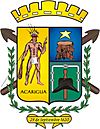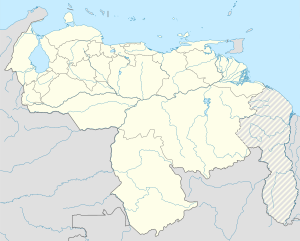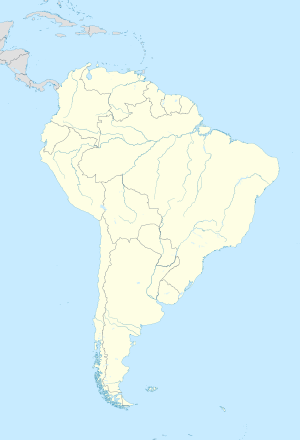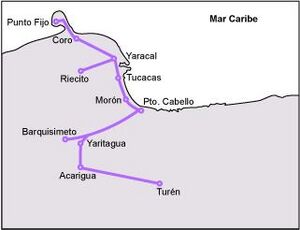Acarigua facts for kids
Acarigua is a city in northwestern Venezuela. It was founded in 1620 as San Miguel de Acarigua. The city is in the northern part of the Portuguesa state. It used to be the capital of this state. Acarigua is a big center for trade in the northern Llanos region of South America. It is right next to the city of Araure.
Quick facts for kids
Acarigua
|
|||
|---|---|---|---|
|
City
|
|||
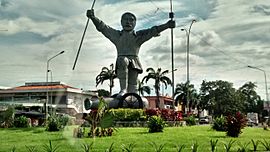
Statue of Portuguesa in December 5 Square (Plaza del 5 de Diciembre)
|
|||
|
|||
| Country | |||
| State | Portuguesa State | ||
| Municipality | Páez Municipality | ||
| Founded | September 29, 1620 | ||
| Area | |||
| • City | 175 km2 (68 sq mi) | ||
| Elevation | 195 m (640 ft) | ||
| Population
(2012)
|
|||
| • City | 203,358 | ||
| • Density | 1,162/km2 (3,010/sq mi) | ||
| • Metro | 208,495 | ||
| Demonym(s) | Acarigüeño (a) | ||
| Time zone | UTC-4:30 (VST) | ||
| Postal code |
3301
|
||
| Area code(s) | 0255 | ||
| Climate | Aw | ||
| Website | Municipal website | ||
Contents
What's in a Name?
The name Acarigua comes from an old word, Hacarygua. The Gayón people, who lived there first, gave this name to the land. The Spanish explorers who arrived later named the area San Miguel de Acarigua. This followed a Spanish tradition of naming cities after saints.
A Look at History
The first records of the Hacarygua area come from a German explorer named Nicolás Federmann. He visited one of the local villages on December 15, 1530. He was on his way to find the famous city of El Dorado. A few years later, in 1535, another German explorer, Jorge Spira, also found shelter and food in what is now Acarigua.
Acarigua became the capital of the Portuguesa state in 1927. But ten years later, in 1937, another city called Guanare took its place.
How Many People Live Here?
In 1990, about 116,551 people lived in Acarigua. By 2008, this number grew to an estimated 208,495. In 2012, the population was 143,704. The Páez municipality, which includes Acarigua, had about 216,827 people in 2020.
Religion
The main church in Acarigua is the Catedral de Nuestra Señora de la Corteza. It is the main church for the Roman Catholic Diocese of Acarigua–Araure.
Geography and Nature
Climate
Acarigua has a tropical savanna climate. This means it is generally hot all year with a wet season and a dry season.
Animals
You can find many interesting animals in the Acarigua area. These include colorful macaws, powerful jaguars, and noisy howler monkeys. You might also see pumas and different kinds of moths. One special moth found here is the Thysania agrippina. It is one of the world's largest moths, with wings that can spread up to 32 centimeters (about 12.6 inches) wide!
Plants
The most common tree you will see around the city is the saman, also known as the Samanea saman.
Parks and Protected Areas
Acarigua has several nice parks and protected areas where people can enjoy nature:
- Parque Musiu Carmelo
- Parque Mittar Nakichenovich
- Balneario Sabanetica
- Balneario el Mamón
- Parque Curpa, also known as José Antonio Páez Park.
Farming and Trade
Acarigua is a very important center for trade in the northern Llanos (plains) region. Many different crops are grown here. The main products include cattle, peanuts, sorghum, cashews, beans, cotton, corn, and rice.
Media
Acarigua has three local newspapers. It also has a community TV station called Siguaraya TV.
Getting Around
Acarigua has its own airport, the Oswaldo Guevara Mujica Airport. It is also part of the Central Western Railway System. The main road to get into the city is the José Antonio Páez Highway.
Sports
The city is home to the football (soccer) team Portuguesa FC. Their home stadium is the Estadio General José Antonio Paez. Other sports places in the city include the Estadio Bachiller Julio Hernández Molina, the Wilbaldo Zabaleta Indoor Gym, and the Cancha Techada 19 de Abril de la Urb. La Goajira.
Famous People
- Luis Antonio Herrera Campins (1925-2007) was a former President of Venezuela.
See also
 In Spanish: Acarigua para niños
In Spanish: Acarigua para niños
 | Dorothy Vaughan |
 | Charles Henry Turner |
 | Hildrus Poindexter |
 | Henry Cecil McBay |



